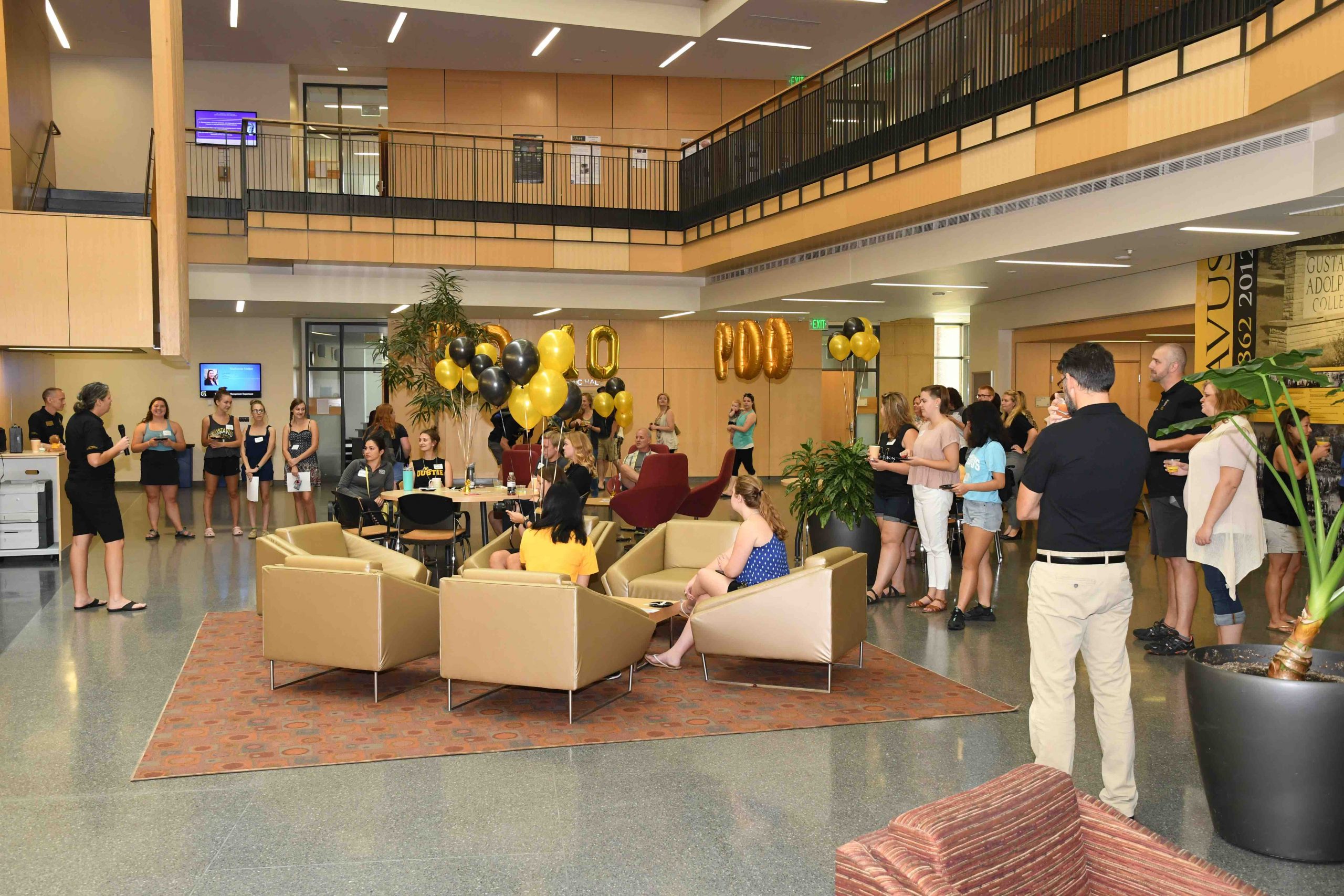The Gustavus Adolphus College communications studies department is celebrating the 10th anniversary of its signature course, Public Discourse. Centered around a semester-long civic engagement project, the course provides students with practical public argument skills and seeks to prepare students to act on the great challenges of our time.
“It didn’t take us long after our first pitch and trial semester to realize that we had something special,” communications studies professor and department chair Leila Brammer said. “There is an exhilaration to the course that comes to life in every Public Discourse classroom. From watching students take something and run with it to collaborating with my colleagues to refine the course’s content, this class is truly empowering for both our students and faculty.”
Designed to integrate argument and civic engagement, the popular course challenges students to identify a problem in a community, research it fully, examine ways to address the problem, and ultimately take action. Throughout the semester, students simultaneously work on their individual community projects and collaborate in a workshop setting to learn theory in public argument and research material.

Created by the communications studies faculty to replace a public speaking requirement in the department, the course’s evolution and growth over the last 10 years has been the result of an intensive collaborative process involving both students and faculty in the department.
Now, both students and faculty are looking back warmly. The self-proclaimed “Public Discourse family” congregated over Homecoming Weekend at Gustavus to celebrate the progress of the course and its impact on the communications studies department, the students, and the communities in focus.
John Baron ‘17 made the trip back to the Hill to celebrate. Shortly after double majoring in political science and communications studies last spring, Baron accepted a full-time job opportunity with Optum as a senior research analyst. His time in Public Discourse did not let him down.
“My employers asked about my ability to solve problems and critically analyze possible solutions. Those are the specific skills I had practiced in my work with Public Discourse. On top of it all, I could show that I had created a significant real-life solution,” said Baron. “One of my biggest takeaways from the class is the power of knowing your audience. Understanding the major issues your audience cares about and wants to hear about is so crucial in any class or job you have in life.
Beyond the analysis and skills he developed, Baron appreciates the transformative power of the class, which he saw first-hand as a teaching assistant for the course.
“To watch the students go from the broad brainstorming of the first day of class to presenting their final plans and solutions to these major problems was so remarkable,” he explained. “I really saw how the class can change the way someone approaches any sort of problem in their life.”
Megan Fillbrandt ‘20 enrolled in Public Discourse as a first-year student, arriving on the first day a little uneasy. By the end of the semester, Fillbrandt had identified a lack of transportation for the elderly community in her hometown of Watertown, Minn., researched extensively, and presented a solution in front of Watertown’s city council. By the next year, the new transportation system she proposed was up and running across the city.
“When I found out that Watertown had their first rider through WeCab and that it was a success, I was beyond excited. If you believe something is possible and you are passionate about it, it is possible to make a change,” said Fillbrandt.
Each academic year, nine sections of the course are offered, engaging approximately 140 students from across all disciplines. Encouraged to take complete ownership of their projects, students are allowed complete freedom in selecting their target community. With 140 students engaged in different communities, like Watertown, around the state, country, and world each year, the civic impact of this course is significant.
“This course is special in its fostering of the student. Students learn a process in its entirety, gain confidence and empowerment, and see themselves as citizens of this world. Not only do they learn that they have a voice that matters, but they are able to use it in real-life communities. We know our classrooms on the Hill are stretching into communities all over the state and the world, and that is very important and very cool to be a part of,” Brammer said.”
What’s next for the Department of Communication Studies? Capitalizing on the decade-long success of the Public Discourse program, the department looks to spark conversations that address pressing issues and make reasoned, community-based decisions through its newly-announced Public Deliberation and Dialogue program.

Leave a Reply
You must be logged in to post a comment.